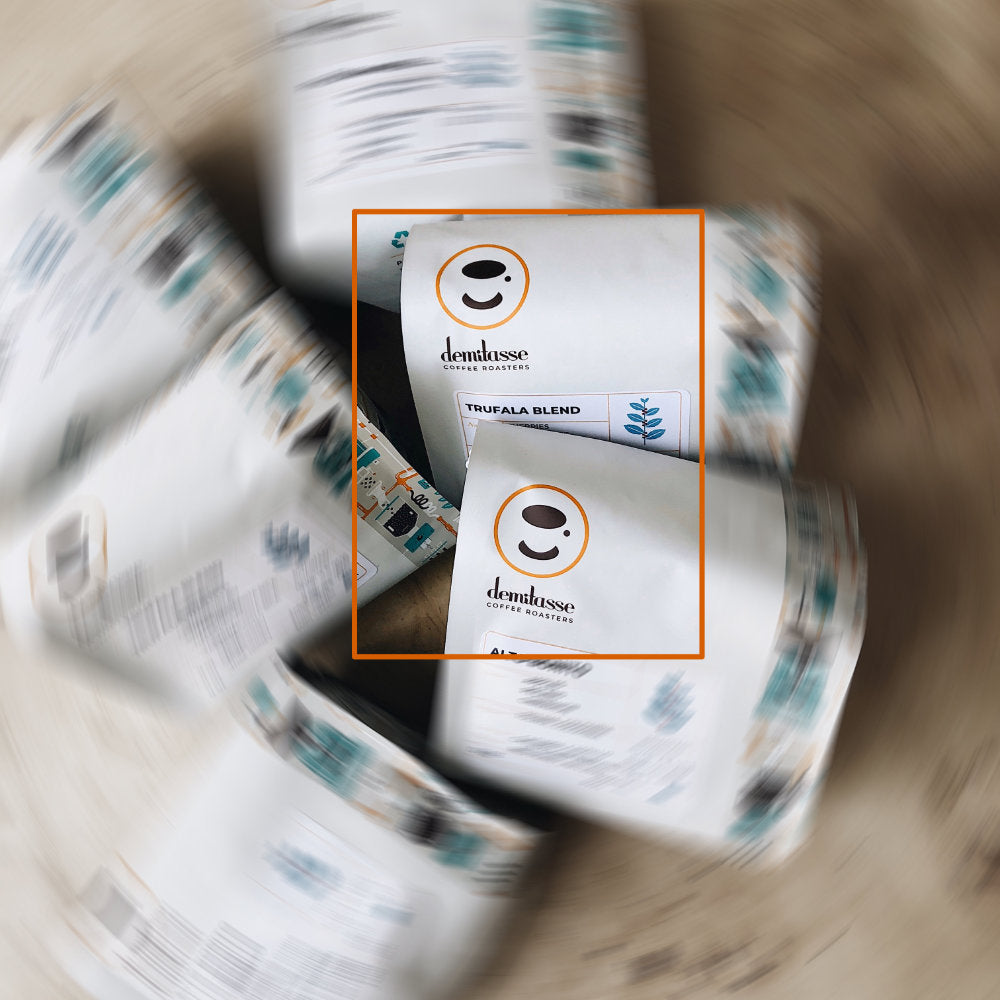
Let's Talk About Bags, Baby
Share
Hello!
As we slowly emerge from COVID, it's been nice to be able to get back to some of our single-use-waste elimination stuff that we had to roll back because of COVID (think stir sticks, wrapped straws, etc). And while we had previously tackled the issue of single-use bags for internal and wholesale customers, there was always this nagging, obnoxious, loud gorilla in the room - retail coffee bags.
Ah, yes, the retail coffee bag. So many people make so many claims about their coffee bags. Most of it...bullshit. And it's beyond frustrating.
Our current retail bags are "recyclable." I put that in quotes because they are only recyclable if you bring them back to us and then we ship them to the manufacturer who allegedly is able to strip the material and reuse it. I say allegedly because...I don't know, but it really feels like they're trying to unscramble an omelette. But let's not be so distrustful here and believe them. Do you know how many of these bags find their way back to us? A tiny, tiny, tiny fraction of what we sell. The rest....waste.
And that's a major problem with a lot of single-use items - even if they are recyclable or biodegradable, they're really not. Not in the way we think about them. Not in a "throw it in my garden" or "throw it in my blue bin" sort of way. For example, there is one bag company that a lot of specialty coffee companies use because of their biodegradable bags (indeed, they brag that the "entire bag" is "fully compostable.") They charge a mint for these bags. When I hear "fully compostable," I think I can put it in my compost pile at home, or bury it in my garden and within a reasonable amount of time, it'll break down with the rest of my compost stuff and return to the Earth.
But you read the fine print:
"Finished packages are industrial compostable in compliance with ASTM D6868 standard for compostable plastics coated with paper (equivalent to ASTM D6400 for packages made of all plastic). (these bags) can be disposed in curbside composting bins, if available."
If you google any of this, you'll quickly realize that these bags can only be composted in industrial or municipal compost centers. Not at home. Not in your yard. LA, by the way, does not have a bin for compost. So that's out.
Let's take a step back for a second and look at the big picture when considering whether something is "eco-friendly" (I hate that term) or not. What we're really saying is that it's not terrible to make OR it's not terrible to dispose of. Ideally both.
But when it comes to bags (and yes, of course we could just throw things in unlined brown paper bags and use an eco-friendly ink and call it a day, but that would not really work well for a food product like coffee that requires some sealing and lining to keep the product fresh), there doesn't appear to be any good end-of-life options. So perhaps we're looking at the wrong end of the spectrum.
We decided to look at how our bags were made and whether there were better options in terms of materials. And much to our surprise, we managed to find some. We found a company based in Australia who uses carbon-negative materials to produce their bags (they actually use a lot of different, interesting materials for different purposes - https://groundedpackaging.co/materials). But we didn't take their word for it. We put them in touch with a friend of a friend who is a senior sustainability manager at Amazon. And she put this company through the ringer, demanding reports and analysis and a whole bunch of things that are way, way, way over my head and pay grade.
And to their credit, they had all of it and she told us that this stuff was actually not the worst. So starting last year, we've been putting all our samples in these bags (if you've ordered a sample pack from us, you've gotten one of these bags) and so far...we've loved them. You still can't compost them or recycle them......but you weren't composting or recycling anything with coffee in it anyway so at least these aren't the worst things to make. (You could, of course, bring in your own canister and get a discount on coffee while saving the world, but who has time for such silly ideas, right? What next, use your own cup?!?! Crazy.)
The other thing we realized was that there is apparently no real evidence for the need for a one-way degas valve you find in every bag of coffee everywhere. Ostensibly it's to let volatile gasses escape the bag from freshly roasted coffee so that your bags don't explode. But search as we have, we honestly couldn't find anything credible on this. We tested it out ourselves and after over a month, our bag hasn't exploded or even inflated much. We check with a few other specialty coffee folks who have ditched the valve (one subscription service we spoke to straight up shrink wrapped their coffees with no valve or space for gas at all) and they had no issues. So in addition to switching to carbon-negative materials, we're ditching an unnecessary piece of plastic.
So that's my diatribe on bags. We'll soon be switching all our bags to these carbon negative ones. Until someone somewhere figures out how to do this right.